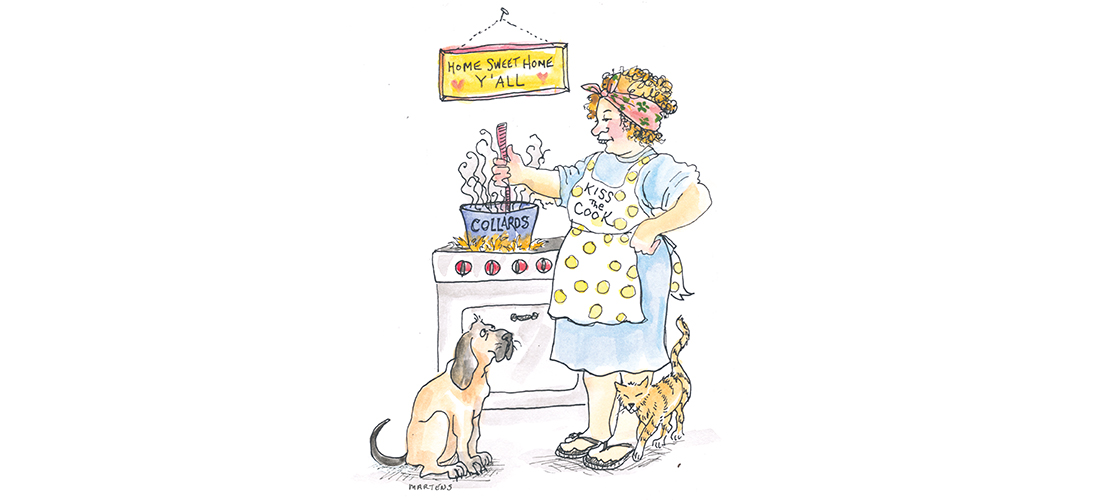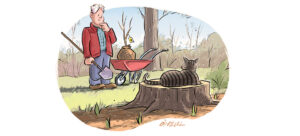
A son remembers that nobody did collards and cornbread better
By Tom Allen
My mother did not fancy herself a cook. Cooks were known for their, well, cooking. When I grew up, cooks were women. I don’t recall hearing a man referred to as “a good cook” even though some were good at cooking — fried fish or barbecued chicken. I guess Hubert Byrd was a cook, probably a good cook. He owned Sleepy’s Grill, in our community, and Lord, he could cook — hamburgers and hot dogs and the best chili.
In the rural culture of my childhood, cooks were women you paid to bake a 12-layer chocolate cake at Christmas or fix a pot of chicken pastry (pastry, not dumplin’s) because pastry was hard to make. There was always something on a cook’s stove — cold biscuits, fried applejacks, crispy fatback. Mom never paid anyone to cook anything. If she couldn’t cook it, we didn’t eat it.
Some cooks worked outside the home — schoolteachers, nurses, mill hands. Regardless of employment, for some, cooking was a side hustle, a second or, perhaps, only stream of income. Most cooks, like good beauticians, were extroverts, people-persons, so that chocolate cake or pot of pastry came with 30 minutes of conversation, the catching-up kind of conversation, not gossip. Cooks don’t gossip. Might lose a customer.
Cooks liked to cook. Mom cooked, not for enjoyment or for money, but out of necessity. We had to eat. Nevertheless, Mom was a good cook, or maybe I should say, she cooked good, at least I thought she did.
Mom baked, which comes under the umbrella of “cooking,” but only two things — coconut chess pie and peach cobbler. That pie was her go-to, year-round dessert. If someone had a baby, a hysterectomy, divorced or died, Mom delivered a coconut pie. Peach cobbler, made with canned peaches (the slippery, cling kind), was a summer dish, although canned peaches are on the shelves year-round. Two years ago, when she died, I included a copy of her handwritten cobbler recipe in the service bulletin. Folks smiled as they shared stories of pies and cobblers that accompanied her support and sympathy.
But my favorite meal Mom cooked was a Southern staple, as indigenous as “Dixie” or a “Bless your heart.” I didn’t miss the combo until I left home for college. Absence, I learned, affects the stomach as much as the heart. Her collards and cornbread filled the void; that combo was my only request when I came home, regardless of the season, since Mom cooked and froze the greens for future consumption.
Collards, those dark green, loose-leaf cultivars, are a fall crop, made sweeter by nip of a first frost. My dad sowed seed in late summer, then thinned and nurtured each plant. By November, he harvested the massive leaves for Mom to cook down in a pot of water, seasoned with fatback or bacon grease. No onion, garlic or red pepper flakes. Perhaps a sprinkle of sugar. Mom’s collards, unlike others I’ve eaten, were chopped fine, to the point you could eat them with a spoon. Collards were a traditional side at Thanksgiving and Christmas, but were just as good thawed and reheated during spring break or with corn and butterbeans from Dad’s July garden.
Collards cooking have an unforgettable smell — pungent, foul. A saucer of cider vinegar or a scented candle toned down but never dispelled the aroma. But that smell was a small price to pay for a plate of pure goodness.
Cornbread was the essential accompaniment. Mom fried her simple version in lard, later canola oil. The batter — Old Mill of Guilford cornmeal, scant water, pinch of sugar, pinch of salt — was dropped by spoonfuls into an iron skillet, where it cooked up, thin and crispy. “Lacy cornbread” she called it. Leftover pones sat on the stove, a paper towel underneath to soak up any grease. Sweet tea completed the meal. Hard to come by in Kentucky, where I attended seminary.
Two years ago, we ate the last package of Mom’s frozen collards. Mother’s Day without her still falls bittersweet. What I wouldn’t give for a plate of collards, lacy cornbread, and her strong, brewed tea, yet I will forever cherish memories of a bitter green made savory and sweet by one who cooked but most of all, was simply . . . good. PS
Tom Allen is minister of education at First Baptist Church, Southern Pines.





